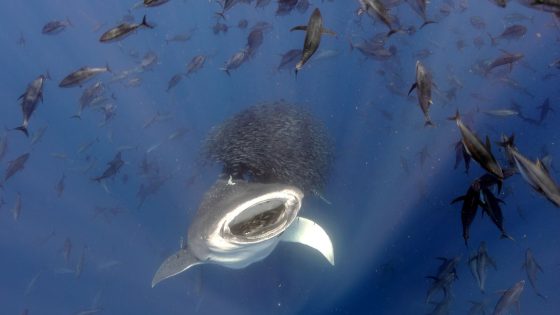A dramatic image of a whale shark rising from the depths to feed on a bait ball has won an international scientific photography competition.
The BMC Ecology and Evolution and BMC Zoology image competition is an annual contest between scientific researchers who snap shots of science and nature in action as they work.
“The slow-moving whale sharks feed on snipefish, herded into tight groups at the surface by large schools of speedy bluefin and smaller tropical tuna, leading to a feeding frenzy,” explained Jorge Fontes from the University of the Azores in Portugal.
A photo of a Kiwikiu being carefully dosed with a few drops of medicine by a scientist was the winner in the Research in Action category.
A single bite from a mosquito carrying avian malaria can be deadly to this endangered species.
The birds used to seek refuge from the insects on the upper slopes of the Haleakala volcano, but because of climate change, the mosquitoes spread to these previously safe areas.
Now, researchers are developing plans to preserve the species.
The runner-up in the category shows a researcher collecting a sediment core in the wetlands of the Florida Everglades, as part of a study investigating methods of reducing phosphorous pollution in the area.
The Protecting Our Planet category winner shows a park ranger assessing coral health at Lady Musgrave Reef in the
southern Great Barrier Reef.
Read more tech news:
Robotaxis frustrate sleepless residents with constant honking
Zuckerberg reveals giant statue of wife
Love Island star on the impact of trolling
The Great Barrier Reef experienced its fifth mass bleaching episode since 2016 between February 2023 and April 2024, each episode caused by heat stress linked to manmade climate change.
A tragic image of a Bonelli’s eagle lying dead beneath the power lines which killed her is the runner-up in the category, the GPS transponder which allowed researchers to track her still clearly visible.
Alwin Hardenbol, from the Swedish University of Agricultural Sciences, photographed an arctic skua attempting to steal a black-legged kittiwake’s fish, to win the Relationships in Nature category.
In the runner-up image in the category, two long-horned bees seek shelter on a Helen’s Bee orchid, which mimics sheltered areas to attract the insects.
A non-pollinating fig wasp, depicted at the moment it deposits its eggs inside the fig, is the winning
image in the Life Close-Up category.
“Given how difficult it is to even spot a tiny fig wasp, which measures just a couple of millimetres, taking this photo would have been a real challenge. Capturing this brief moment tells a great story,” said BMC Zoology board member Brock Fenton.
The runner-up picture in the category shows a section of a fossilised Megapnosaurus femur, viewed through a microscope.
Source Agencies












